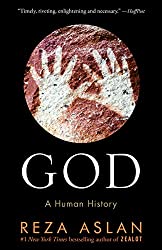
Rating: 7.8/10.
A story of how the idea of God developed and evolved, from an anthropological rather than religious perspective. The author is from Iran and was born a Muslim, converted to Christianity, then converted back to a Muslim, so he is familiar with multiple religions.
Humans have an instinct to believe in god, and have done so since prehistoric times. Paintings and hand prints were found in caves, but these were religious and ceremonial sites, not places where people lived. Religion doesn’t provide any direct advantages for us (arguments involving social cohesion and altruism don’t hold up to scrutiny), but rather as a byproduct of a survival mechanism makes us see humanlike qualities in inanimate things. We ascribe this to the supernatural and this forms the basis of religion.
Neolithic revolution is when humans first began transitioning from hunter-gather to agrarian lifestyle. Author argues that religion preceded this transition: the Golbekli Tepe was constructed before agriculture by hunter-gather peoples, and this settlement in the same place for a long time enabled agriculture to be possible.
We have a tendency to humanize our gods, but only to a partial extent since if they have too many humanlike flaws, then they cease to become gods. Most religions were polytheistic, two attempts at monotheism in Egypt and Iran didn’t really take off. The difficulty was it was hard to ascribe contradictory qualities to a single god; this is solved by making the god more abstract. Judaism was the first monotheistic religion. Israelites started off as a subgroup of the Canaanites, but didn’t become monotheistic until their defeat by the Babylonians.
Christianity began as a Jewish sect that believed in Jesus Christ as a god. However, it was unclear for a while what was the relationship between Jesus and the old god Yahweh, and some early Christians believed they were two separate gods that were enemies of each other. The issue was settled in Emperor Constantine’s time and the Holy Trinity interpretation was formed. Islam arose in the 7th century by a prophet Muhammed that claimed to have received revelations from the god Allah. This religion had a lot in common with Judaism, but crucially Allah is an abstract god that has no human form.
Overall, a good book that examines the early history of religions through historical lens. There are some parts of the argument that are sketchy though. There’s a lot of debate about the causes of the Neolithic revolution, but the author calmly presents the religion-first hypothesis as though it were fact. Also, the explanation of how Judaism became monotheistic makes little sense: he claims the Jews doubled down on the belief that their god Yahweh was the only god, in order to avoid accepting that the Babylonian god Marduk was more powerful than Yahweh. I don’t like authors that present their own tentative hypotheses as fact, but this seems quite common when it comes to religion.



